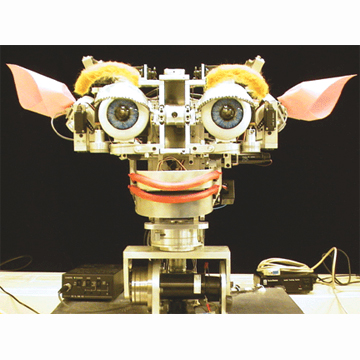Pediophobia and the Uncanny Valley
 The "uncanny valley" is one of my favorite concepts. It describes humanoid objects. As things look more and more human, we are attracted to them more and more. But there is a limit-- at some point they look real enough to look like human bodies, but the way they act is not realistic enough for them to look like they are healthy human beings. The attraction turns to disgust and revoltion. Then, as the creatures get more humanlike, the attraction rises again. Graphing this, with human-likeness on the x axis and attraction on the y, we see a dip just before realistic human behavior. This dip is called
The "uncanny valley" is one of my favorite concepts. It describes humanoid objects. As things look more and more human, we are attracted to them more and more. But there is a limit-- at some point they look real enough to look like human bodies, but the way they act is not realistic enough for them to look like they are healthy human beings. The attraction turns to disgust and revoltion. Then, as the creatures get more humanlike, the attraction rises again. Graphing this, with human-likeness on the x axis and attraction on the y, we see a dip just before realistic human behavior. This dip is calleduncanny valley.
Examples of things that are, for many people, in the uncanny valley
include
- Wax statues of human beings. They look real, but are not moving
at all, so they look dead. - Realistic characters in video games and computer-generated
movies. The facial expressions are not quite right. The way they
move is not quite right. They look sick, or like walking, talking
corpses. - Mimes. People doing pantomime train to move their bodies
in unusual ways. This can look kind of eerie. This effect is
exacerbated with white face paint (which is part of why people fear
clowns, I expect). Doing "the robot" can be
frightening for the same reason. What's wrong with these people? - Puppets. They sometimes have enough superficial
similarities to human beings to make us expect human behavior, but
then they don't come through. Note the use of scary puppets and
dolls in the Chuckie movies like Child's Play and the clown
in Poltergeist.
It was first described by Masahiro Mori.
Pixar deliberately tries to make their characters appear cartoon-like, specifically because they want to avoid the uncanney valley. Note that Geri in Geri's Game is like a caricature of an old man. Compare this to the zombies trying to act in the Final Fantasy: The Spirits Within movie. It's hard to see the valley without these things in motion.
Compare this to the zombies trying to act in the Final Fantasy: The Spirits Within movie. It's hard to see the valley without these things in motion.
Pixar deliberately tries to make their characters appear cartoon-like, specifically because they want to avoid the uncanney valley. Note that Geri in Geri's Game is like a caricature of an old man.

Cynthia Braezeal's "Kismet" project tries to do the same thing. By making her robot look like a cute toy, rather than a human being, she avoids the valley.

One man is trying to build robots that are super-realistic. He's trying to make robotic heads that can emote so well that it looks real-- it's trying to cross uncanney valley! Nobody else is trying to do this in robotics. This guy believes the uncanny valley is pseudoscience: http://iiae.utdallas.edu/news/pop_science.html

One man is trying to build robots that are super-realistic. He's trying to make robotic heads that can emote so well that it looks real-- it's trying to cross uncanney valley! Nobody else is trying to do this in robotics. This guy believes the uncanny valley is pseudoscience: http://iiae.utdallas.edu/news/pop_science.html
and there's an impressive video here:
http://iiae.utdallas.edu/projects/hanson.html
Though this one looks much creepier:
Though this one looks much creepier:
(Thanks to Daniel Saunders for pointing me to these things.)
I read about an exhibit recently that featured people's fears. They had people write in fears. The artists categorized them and made different rooms based on the fears. They grouped all fears of "false representation of sentient beings" together under the name "pediophobia" (Schulman, 2006). I think they might have made up this word, since I can't find anything about it on the internet. But it's basically an extreme fear of the uncanny valley.
I read about an exhibit recently that featured people's fears. They had people write in fears. The artists categorized them and made different rooms based on the fears. They grouped all fears of "false representation of sentient beings" together under the name "pediophobia" (Schulman, 2006). I think they might have made up this word, since I can't find anything about it on the internet. But it's basically an extreme fear of the uncanny valley.
Schullman, M. (2006). Worst Nightmares. The New Yorker, October 30, p38.

Comments
Another category of images that I feel fall into the valley are these sort of modified portraits.
The literature and/or studies out there seem very scarce. Once in awhile I'll Google the term to see if anything new is out there (that's how I came across this Blog actually). It's a very real phobia but it doesn't affect my life detrimentally unless I'm put into a situation where I'm in close proximity to dolls, mannequins, puppets, or ventriloquit dolls; avoidance is the key for me.
Anyways, I've only recently came across the data on the "uncanny valley" and a possible link to my phobia. While the two may truly be intertwined, in the real world people like myself only relate fear and evil to such objects. I'd like to see some more studies or professional journals pursue this phobia more agreeively and see what they come up with. In the meantime, thanks for having at least SOMETHING to say on the subject; perhaps it'll raise more awareness.
Ronnie Flores
RF